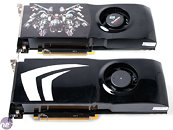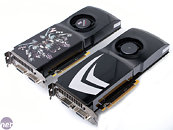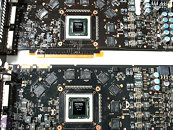Thursday, June 19th 2008

NVIDIA Gently Intros GeForce 9800 GTX+
AMD today took a major point for the red team by positioning its brand new ATI Radeon HD 4850 cards between NVIDIA's GeForce 9 series and GTX 200 series cards. The all new HD 4850 cards beat NVIDIA's GeForce 9800 GTX while also maintaining the very reasonable MSRP of $199. Currently NVIDIA has no card that can compete in this category, but that's eventually going to change in mid-July, when the company will announce a new mid-range video card dubbed GeForce 9800 GTX+. The card will be idential to GeForce 9800 GTX from the outside, but from the "inside" it will use a smaller and more efficient 55 nanometer GPU with increased default clock/shader speeds: from 675MHz to 738MHz and from 1688MHz to 1836MHz respectively. Memory speeds for this card will be dropped slightly to 1GHz (1100MHz for GeForce 9800 GTX). Other than that the card is virtually the same as GeForce 9800 GTX, the three-way SLI support also remains untouched. NVIDIA expects to start offering GeForce 9800 GTX+ with a MSRP of $229. The company also plans to drop the price of the 65nm GeForce 9800 GTX to $199.
First card is Leadtek 9800GTX, second one is GeForce 9800 GTX+
Source:
bit-tech.net
First card is Leadtek 9800GTX, second one is GeForce 9800 GTX+



137 Comments on NVIDIA Gently Intros GeForce 9800 GTX+
And they leave us 8800GT users in the dark. BRAVO NVIDIA.
If the 9800GTX (old) is sold for $199, take a look at these:
Even at $199 it's not worth it. Add to that, the much higher power requirements of the 9800GTX (and need for 2x 6-pin or 6-pin + 2x molex power inputs). Add to that, lesser options of scalability compared to HD4850. You can use upto 4 HD4850's in tandem, you can't with the 9800GTX. If $400 is all I have, I'd buy a 790FX board and a HD4850 now, enjoy all the games, keep buying a HD4850 each month so end of four months I have a fairly powerful graphics sub-system.
lol 20% for free is the best value for money I've seen in a while. It makes this price drop worth even more than it seems given that most benchmarks were using the older drivers.
OMG you bought a 9700PRO for $300 in 2002? i got an 8800GT for $200 this year! omg you must feel stupid!
sorry if this comes off as petty, but those kind of comments are very short-sighted... a cheaper, better value card ALWAYS comes out, in time.
and i really think anybody who bought a 9800gtx was pretty stupid if they didnt get somekind of uber deal, since they 8800gts g92 gives same perf, hell mine hits 788/1900/2020 no problem, thats faster then the new 9800gtx+........
If someone didnt wait and rushed out they didnt get a bad deal... they paid the extra money to get the card faster because they didnt want to wait.
Speed, quality, price: pick two
Its a universal law for buying things.
(speed being speed at which you get the item, not speed of hardware)
*Like 8800 GT, 9600GT... always taking into account yours are better bt you don't want to unleash their power by the drivers you are holding back :)
Of course I'm basing my numbers on the belief that the card has 40 TMUs and thus it has "enough" of them or at least as much as HD3870 of them to have a similar under load usage. And note that I said similar, as I DO believe all new cards are being underused, as well as fastest older cards: GX2 > X2 > 9800GTX in order of lesser usage of real power.
If TMU number is smaller you could be right and many SPs could not be used, though we have to wait a week and see, but there are enough "hints" out there to make me believe it has 40.
Don't talk about GDDR5 here because it doesn't use it.
There's no doubt all the things you mentioned are true, but IMO the process is a lot more relevant. Ati is always the first to jump to those new processes, so they are simply not mature when they first use them. They take a risk and sometimes it pays off and sometimes not. Not to say that what you say it's also true and, in fact, many of the enhancements you mentioned have a lot to do with the fab process, because being smaller, the arrangement has to change. This is true, but if Ati wasn't able to come with the right arrangement in the first place, Nvidia will probably not do it better. Only that is one reason not to change. Let's see another one:
Price - What I'm going to say can be applied to GDDR5 too. When talking about the price of the fab process and the benefits you are going to obtain, you can't simply compare the price as it is now (or was when Ati started using it) and say it pays off to do the change. Nvidia has 60-70% of the discreet market share, that means it has to produce twice as Ati if they want to mantain it. Current manufacturing costs of 55nm (remember GDDR5 too) are based on the demand of pretty much only Ati's needs and they strugle to meet demand. Mix Nvidia in and you need to multiply the supply by 3x. They can't do that, so prices would skyrocket. As a fact TSMC already upped all of his prices because of this same reason and increasing costs (that at the same time are related to the demand too). If prices went up it would be bad for both companies, not to mention consumers, but because Ati is targeting a lower priced market that situation would be beneficial for them, but in no way for Nvidia. For Nvidia is just better to not enter that price/supply war and make prices lower as long as theay are competitive. Don't dare to ask if this point is not well explained.
so 1 gpu is as powerful as the top dual ati gpu solution?
thats good
only idiots would buy this updated 9800 because there are new cards around the corner and the relative performance increase over a normal 9800gtx is minute probly a little higher clocks due to it being smaller a little less power usage
the problem is the 4850/70 is more powerful than the 9800gtx
your only taking into account the price, even then the 4850 is the card of choice in next gen due to the price either way ill have to wait and see if the next nvidia cards are any better performance wise enuf to justify the price